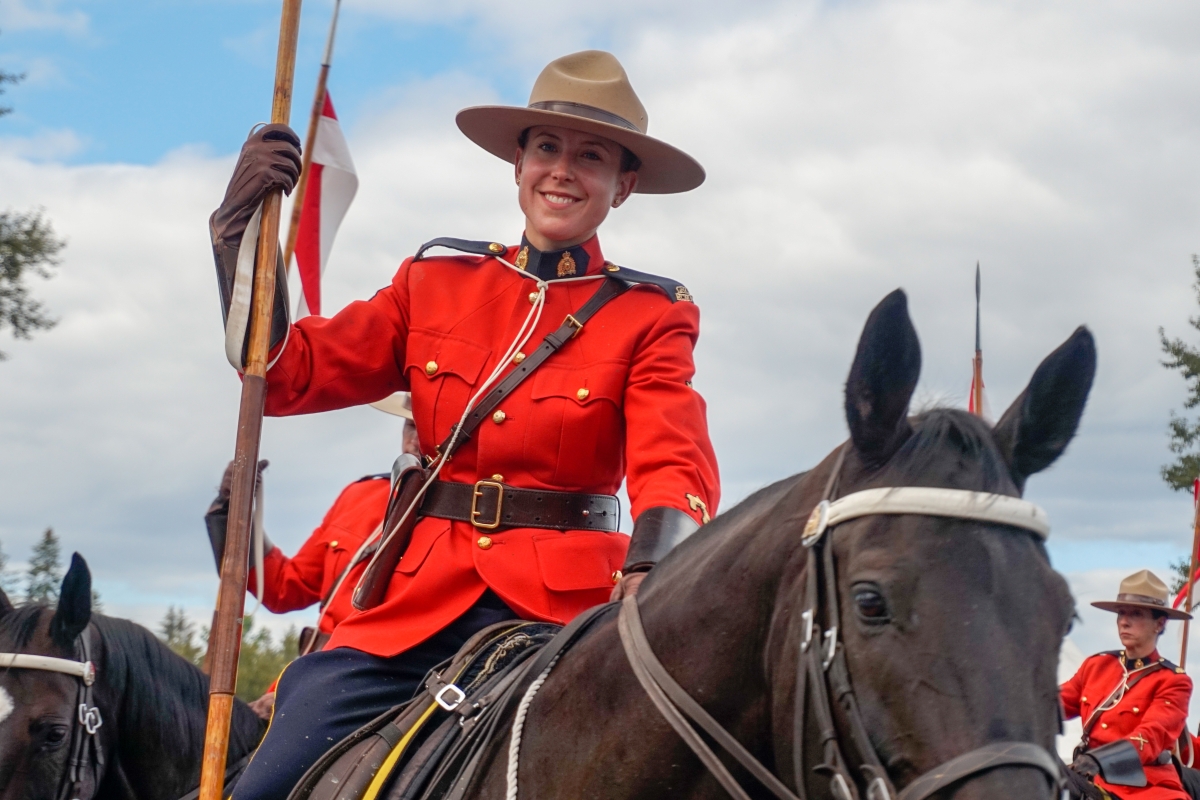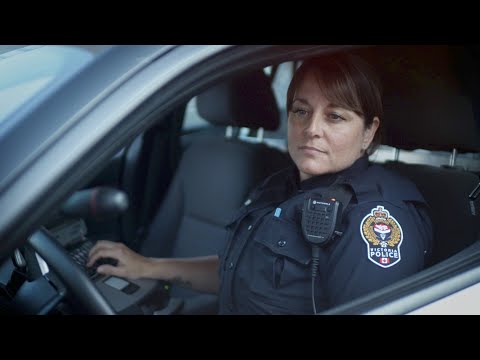Career Overview
Police officers protect the public’s safety, make sure that federal, provincial and municipal laws are followed. They respond to emergency calls, patrol public areas, regulate traffic, control crowds, arrest offenders and build community relationships.
This career group includes military police and railway police.
Police officers in B.C. work for police departments (PDs) that serve specific cities such as the Vancouver PD or Victoria PD. They also work for B.C. Transit Police or the Royal Canadian Mounted Police (RCMP), which is run by the federal government. The RCMP provides contract policing to cities and towns that don’t have their own police force. In addition, they provide contract policing for the Province of B.C.
Job Titles
Duties
Police officers performs some or all of the following duties:
- Respond to emergency calls and complaints, execute search warrants and arrest criminal suspects
- Patrol communities on foot, horseback, bicycle or motorized vehicle to keep the public safe, maintain order and enforce laws and regulations
- Take notes and write reports
- Provide testimony in courts of law
- Provide support and help to victims and witnesses of crimes, accidents and natural disasters
- Monitor traffic to ensure motorists observe traffic regulations and test persons suspected of driving under the influence of alcohol and drugs
- Control crowds at public events and protests and monitor suspicious and violent behaviour
- Perform daily administrative tasks in support of law enforcement activities, such as maintaining equipment and information files
- May assist police investigators in criminal investigations
Earnings
Earnings is income that workers receive in exchange for their labour. Depending on the type of employment, earnings can be in the form of wages (hourly), salaries (fixed monthly or annual) or self-employed earnings.
Work Environment
# Workers Employed
10,135% Employed Full Time
84%Police officers work in indoor and outdoor settings and may have to deal with a range of weather conditions. They may spend their shifts in patrol cars, in an office setting at a police detachment or at different types of crime and accident scenes. Police work can be dangerous and has the potential for injuries.
Career Pathways
Police officers can progress in this career or work in specialized policing fields if they have the required work experience and have completed specialized courses.
Related Careers
Occupational Interests
It’s important to understand what kinds of occupations align with your interests.
For more about occupational interests visit Skills for the Future Workforce > Characteristics.
Here are the top occupational interest(s) for this career profile:
Education, Training and Skills
To be a police officer, a secondary school diploma is required. In addition, completion of a college program or university degree in law and security or in the social sciences is usually needed. A three- to six-month police training program is provided upon being hired.
Physical ability, strength, fitness and vision requirements must be met, and psychological or other tests may also be needed.
Specialized training or certification may be required for certain areas of policing.
Education programs in B.C.

Top Skills
Every job calls for a certain set of skills. Knowing those skills is the first step in finding a good career fit.
Here, you will find the 10 most relevant workplace skills. Some are more important to achieving success in a certain career than others. These skills may come naturally to you or you may need to gain them through education, training and experience.
See the list of work-related skills below, ranked in order of importance for this career. Check out the list and see if this career matches your skills—take that first step!
Giving full attention to what other people are saying, taking time to understand the points being made, asking questions as appropriate, and not interrupting at inappropriate times.
Talking to others to share information effectively.
Using logic and reasoning to identify the strengths and weaknesses of alternative solutions, conclusions or approaches to problems.
Understanding written sentences and paragraphs in work-related documents.
Being aware of others’ reactions and understanding why they react as they do.
Communicating effectively in writing as appropriate for the needs of the audience.
Being able to solve novel, ill-defined problems in complex, real-world settings.
Considering the relative costs and benefits of potential actions to choose the most appropriate one.
Understanding how new information could be used to solve current and future problems in making decisions.
Keeping track of and assessing your performance, other individuals, or organizations to make improvements or take corrective action.
Labour Market Statistics
Discover data, facts and information that have been gathered and analyzed. Learn about the characteristics of the economy and labour market in B.C.
Employment
Find out about employment types and trends by region and industry.
Employment
10,135Employment by Region







| Region | Employment | % Employment of this Occupation |
|---|---|---|
| Cariboo | 355 | 3.5% |
| Kootenay | 185 | 1.8% |
| Mainland/Southwest | 6,515 | 64.3% |
| North Coast and Nechako | 235 | 2.3% |
| Northeast | 155 | 1.5% |
| Thompson-Okanagan | 1,100 | 10.8% |
| Vancouver Island/Coast | 1,595 | 15.7% |
Labour Market Outlook
The B.C. Labour Market Outlook is a 10-year forecast of the expected supply and demand for labour in the province. It’s usually updated every year. The purpose is to provide British Columbians with the knowledge to make informed decisions on careers, skills training, education and hiring.
Forecasted Job Openings (2024-2034)
4,660Forecasted Job Openings
Forecasted Employment Growth Rate
Composition of Job Openings
Job Openings by Region (2024-2034)







| Region | Job Openings | Avg. Annual Employment Growth |
|---|---|---|
| Cariboo | 180 | 0.0% |
| Kootenay | 40 | -0.2% |
| Mainland/Southwest | 3,290 | 1.9% |
| North Coast and Nechako | 40 | -0.7% |
| Northeast | 10 | -0.8% |
| Thompson-Okanagan | 400 | 0.5% |
| Vancouver Island/Coast | 690 | 1.4% |
Industry Highlights
Learn about the opportunities in B.C.'s major industries, including employment trends, earning potential, locations of work and more.
Forecasted Job Openings by Industry
| Industry | Job Openings (2024-2034) |
|---|---|
| Public Administration | 4,620 |
| Educational Services | 10 |
| Professional, Scientific and Technical Services | 10 |
Insights from Industry
The ability to remain calm during highly stressful situations is crucial for a person with this job. Police officers regularly interact with members of the public, including those accused of crimes and victims of crimes. For many people, contact with a police officer may come during an upsetting, scary or tragic time in their life and they may react with anger, fear or even act violently. Good communication skills and empathy are needed since police officers deal with many people each day.
Police officers often work in culturally diverse neighbourhoods and communities and it’s important for them to understand different cultures and ways of life. In addition, being able to speak a second language is a valuable skill.
Resources
-
Justice Institute of British Columbia (JIBC) Career Pathswww.jibc.ca/career-paths
-
Metro Vancouver Transit Policewww.transitpolice.bc.ca
-
Royal Canadian Mounted Police (RCMP) Careerswww.rcmp-grc.gc.ca/recruiting-recrutement/index-eng.htm
-
Royal Canadian Mounted Police (RCMP) E-Division (B.C.)bc.rcmp-grc.gc.ca
-
Vancouver Police Department Careersvpd.ca/join-us/recruiting/
-
Victoria Police Department Careerswww.vicpd.ca/careers
-
Surrey Police Service Careerswww.surreypolice.ca/careers








